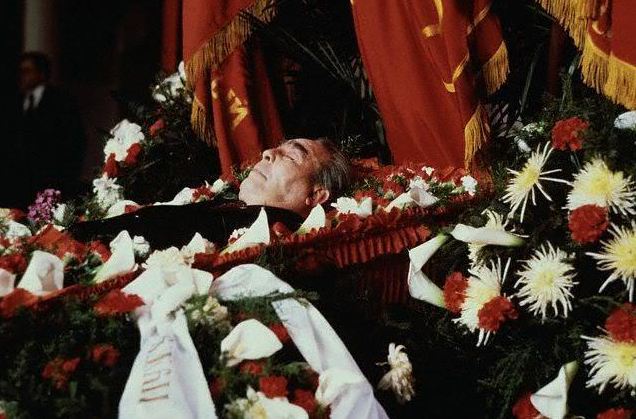The official narrative of Leonid Brezhnev’s death is that he died of abrupt heart arrest. Despite the Secretary General’s poor health, his untimely death has resulted in several misconceptions. And it’s no surprise: some of the circumstances surrounding Brezhnev’s death remain odd. His mysterious death is one of the top political events in the 80s.
Who is Leonid Brezhnev?
Leonid Brezhnev was a former Soviet Union statesman and member of the Communist Party. For eighteen years, he was the head of the Soviet Union. As a result of his proposals, the Soviet Union gained parity with the United States in the field of strategic nuclear weapons. Under his direction, the Soviet Union’s space program was a resounding success. Unfortunately, due to the overabundance of cash allocated to the defense and aerospace industries, agriculture, consumer products, and health care have all faced funding shortages.
Leonid was a crucial figure in the overthrow of Nikita Khruschev. It was the same Khruschev who he considered as his political guru. His character has the admirable trait of being a team player who made political judgments after talking with his colleagues. By implementing his approach, he was instrumental in mending relations between West Germany and preserving a cordial relationship with the United States. He is accused of ushering in an age of economic stagnation in which significant problems were ignored, eventually leading to the Soviet Union’s collapse.
During the late 1970s and early 1980s, Leonid’s political actions are said to have been responsible for the rise of corruption and prejudice inside the Soviet bureaucracy.
Health Condition
Brezhnev’s personality cult was exploding at a time when his health was rapidly deteriorating. His health was failing; he had been a heavy smoker until the 1970s, had developed an addiction to sleeping medications and tranquilizers, and had started drinking excessively.
Brezhnev’s central nervous system deteriorated steadily from 1973 until his death, and he had multiple small strokes as well as sleeplessness. He had his first heart attack in 1975. Brezhnev moved shakily and bungled his speech when he received the Order of Lenin.
According to one American intelligence specialist, US officials had known for some years that Brezhnev had severe arteriosclerosis and suspected he had other unidentified illnesses as well. Brezhnev also suffered gout, leukemia, and emphysema as a result of decades of heavy smoking, as well as chronic bronchitis, according to American intelligence officers in 1977.
He was said to have had a pacemaker implanted to regulate his cardiac rhythm problems.
Brezhnev’s capacity to govern the Soviet Union was severely harmed after he had a stroke in 1975. As the General Secretary’s ability to define Soviet policy deteriorated, he increasingly deferred to the views of a hardline brain trust that included KGB Chairman Yuri Andropov, longtime Foreign Minister Andrei Gromyko, and Defense Minister Andrei Grechko, who Dmitriy Ustinov succeeded in 1976. Despite his diminished capacity to rule, Brezhnev maintained to have an ultimate say on all critical decisions until the end of the 1970s.
Last hours of Leonid Brezhnev
The testimony of the witnesses who recounted Leonid Brezhnev’s last hours raises several issues. Despite his health difficulties, Brezhnev lived a reasonably busy lifestyle in October-November 1982, according to Alexander Ostrovsky, author of the book “Who put Gorbachev?” As Ostrovsky put it, the General Secretary was like a second wind: he engaged in discussions, delivered prizes, went throughout the nation, hunted, and spent several hours on the balcony of the Mausoleum during a protest commemorating the October Revolution’s anniversary. According to Ostrovsky, Brezhnev felt well these days, despite the strain he was under as an astronaut, 120 above 80.
Leonid Ilyich had been working considerably longer than expected in connection with his well-being on November 9, 1982: he handled the paperwork this afternoon. According to Roy Medvedev’s book “Political Portraits,” the Secretary-General arrived at the District cottage at half-past seven o’clock in the evening. And there’s no denying it. Continue to cause uncertainty, though. For example, according to Alexey Pimanova’s documentary film “the Kremlin-9,” Brezhnev went to bed that night, already in the country, reading the press release as usual. However, Leonid Brezhnev’s security guard, Vladimir Medvedev, stated that his “mentee” from viewing your beloved “Time” resisted.
The facts mentioned above and diagnosis contradict the fact that no doctor was there at Leonid Brezhnev’s death at the dacha outside of Moscow.
Leonid Brezhnev died in 8 hours and 30 minutes, according to the official verdict. However, other experts feel it is the incorrect time and may have been manipulated purposefully. According to Victoria Petrovna, a diabetic, the nurse gave her an insulin shot at 8 a.m. Brezhnev was still alive at this point when he rolled over on his bed in front of his wife. When the guards woke up the Secretary-General after Brezhnev had breakfast, they suspected something had occurred. A lengthy resuscitation began.
As a result, according to Anatoly Tereshchenko’s book “Bells of Alarm,” the Secretary General’s death could not be determined before 10:30 a.m.
